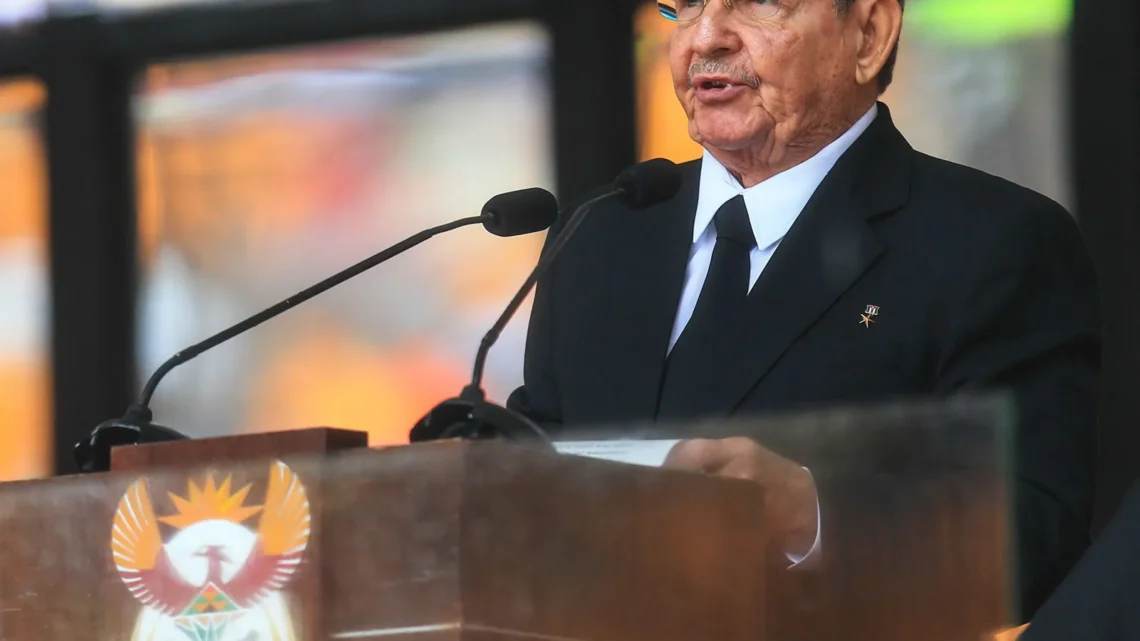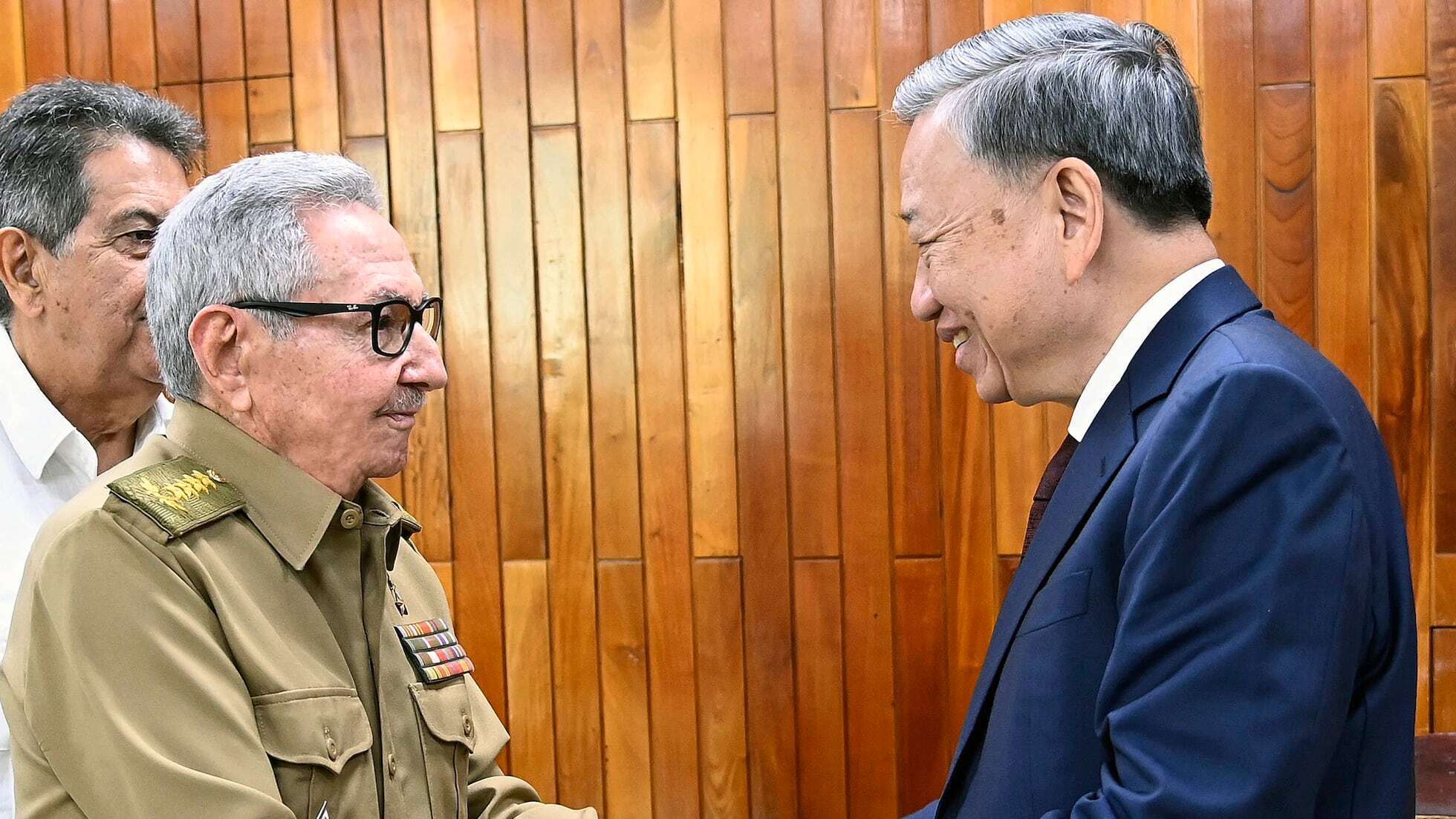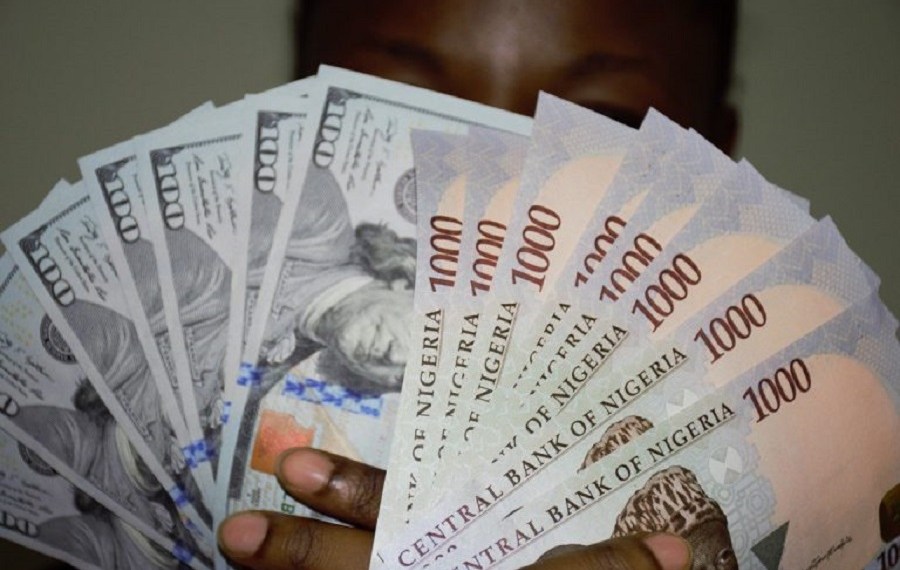
Raul Castro Biography: Net Worth, Age, Health, Wife, Grandson, Parents, Family, Children
0 Posted By Kaptain KushBiography
Raúl Modesto Castro Ruz, born on June 3, 1931, in Birán, Cuba, is a key figure in Cuban revolutionary history and politics. He is a celebrated Cuban retired politician and general.
He is most recognized as the younger brother of Fidel Castro, with whom he shared leadership responsibilities in the Cuban government.
Trending Now!!:
- Zainab Ahmed Biography: Age, Net Worth, Family, Pictures, Wiki, Husband, Father, Phone Number, State Of Origin
- Joko Widodo Biography: Religion, Age, Children, Wife, Net Worth, Education, Wikipedia, Pronunciation
- Anthony Scaramucci Biography: Net Worth, Wife, Age, Children, Twitter, Bitcoin, Algorand, Crypto, Daughter, House, Skybridge
- Katie Hill Biography: Salary, Age, Twitter, Net Worth, Husband, Brother, Resigns, Wiki, Height, LinkedIn, Photos, Movies
- Hillary Clinton Biography: Child, Age, Husband, Height, Net Worth, Quotes, Childhood, Partner, Twitter, Documentary, Speech, Wikipedia, Books
Raúl embraced socialism early on, joining a communist youth group and taking part in the 1953 attack on the Moncada Barracks, an event that led to his imprisonment alongside Fidel. Following their release, Raúl played an essential role in the 26th of July Movement, which overthrew the Batista regime in 1959 and established a socialist government in Cuba.
After the revolution, Raúl was appointed Minister of Defense in 1959, a position he held until 2008. He also served as second-in-command in various government bodies, including the Council of State and the Council of Ministers. In 2006, as Fidel’s health declined, Raúl became acting president and formally took on the role in 2008. As president, he introduced economic reforms to modernise Cuba’s socialist system, such as allowing limited private enterprise and encouraging foreign investment.
Raúl stepped down as president in 2018 but continued to lead the Communist Party of Cuba until April 2021, when he passed the role to Miguel Díaz-Canel. Despite his retirement, Raúl remains a significant figure in Cuban politics, holding a seat in the National Assembly and maintaining the title of Army General.
| Description: | Former President of Cuba |
Raul Castro | |
|---|---|
 | |
| Wiki Facts & About Data | |
| Real Name: | Raúl Modesto Castro Ruz |
| Stage Name: | Raul Castro |
| Born: | 3 June 1931 (age 93 years old) |
| Place of Birth: | Biran, Cuba |
| Nationality: | Cuban |
| Education: | Colegio Dolores, Belén Jesuit Preparatory School |
| Height: | 175 cm |
| Parents: | Ángel Castro y Argiz, Lina Ruz González |
| Siblings: | Fidel Castro, Ramón Castro Ruz, Juanita Castro, Manuel Castro Argota, Emma Castro, Ángela María Castro Ruz, Agustina Castro, Pedro Emilio Castro Argota, Lidia Castro Argota, Georgina Castro Argota, Antonia Maria Castro Argota |
| Spouse: | Vilma Espín (m. 1959–2007) |
| Girlfriend • Partner: | Not Dating |
| Children: | Mariela Castro, Alejandro Castro Espín, Nilsa Castro, Déborah Castro |
| Occupation: | Politician • General |
| Net Worth: | $100 million-$150 million (USD) |
Early Life & Education
Raúl Modesto Castro Ruz was born on June 3, 1931, in Birán, a small town in the Holguín province of Oriente, Cuba. At the time, Cuba was under the dictatorship of Gerardo Machado.
Raúl was of mixed Spanish and Cuban descent, with his father, Ángel Castro y Argiz, being a Spanish immigrant from Galicia, and his mother, Lina Ruz González, having Cuban and Canary Islander roots, which was common in the eastern part of the country. Raúl was raised in a nominally Catholic household but later became an atheist, aligning with the Marxist-Leninist ideology of the Cuban government.
Ángel Castro, Raúl’s father, was a successful farmer who owned significant land and grew sugar cane and other crops. Lina, his mother, was originally Ángel’s housekeeper and later became his wife after the death of his first wife.
Raúl was one of seven children: Fidel Castro, the most famous sibling, who led the Cuban Revolution and served as Cuba’s president; Ramón Castro, an older brother involved in agriculture and supportive of the revolution; Juanita Castro, a sister who defected to the U.S. and became a vocal critic of the Castro regime; Emma Castro, a sister who stayed in Cuba with minimal political involvement; Ángelita Castro, the youngest sister, also not politically active; and Pedro Emilio Castro, a half-brother from Ángel‘s first marriage.
Raúl’s early education took place in local schools in Birán, and he attended the Colegio Dolores in Santiago de Cuba for his initial secondary education. After the family moved to Santiago, he continued at the Belén Jesuit Preparatory School in Havana but was expelled due to his involvement in revolutionary activities. Despite having limited formal education, Raúl was largely self-taught, focusing on political theory and military strategy while in prison and exile.
Career
Raúl Castro‘s career is closely linked to the Cuban Revolution and the governance of Cuba that followed. He joined the fight against Fulgencio Batista‘s dictatorship at a young age, taking part in the 1953 attack on the Moncada Barracks, which resulted in his imprisonment.
After being released in 1955, Raúl was exiled in Mexico with his brother Fidel, where they plotted Batista’s overthrow. In 1956, Raúl returned to Cuba aboard the Granma yacht, marking the beginning of the guerrilla campaign in the Sierra Maestra. As Fidel‘s second-in-command, Raúl led the 2nd Front “Frank País,” demonstrating strong military and organizational abilities.
Following the revolution’s success in 1959, Raúl was appointed Minister of Defense, a position he held for nearly 50 years. He played a key role in reorganizing Cuba’s armed forces and implementing universal military service. Raúl held various prominent positions throughout his career, including membership in the National Directorate of the Integrated Revolutionary Organizations (IRO) and the Communist Party of Cuba (PCC), eventually becoming one of its top leaders. As Second Secretary of the PCC, he effectively served as Fidel’s deputy in both military and political matters.
When Fidel‘s health deteriorated in 2006, Raúl assumed the role of acting president and officially became President in 2008 following Fidel’s retirement. During his presidency, Raúl introduced several economic reforms, including greater private enterprise, expanded self-employment opportunities, and the opening of the real estate and automobile markets to private involvement. He also worked to improve relations with the United States, contributing to the landmark decision by the Barack Obama administration to normalize relations with Cuba in 2014.
Raúl stepped down as president in 2018, passing the leadership to Miguel Díaz-Canel, but remained First Secretary of the Communist Party until April 2021. His leadership was marked by a more pragmatic approach to governance than his brother’s, focusing on economic modernization while preserving the socialist system. Raúl Castro also played a significant role in global politics, supporting socialist movements across Latin America, Africa, and Asia.
Personal Life
Raúl Castro was born on June 3, 1931, making him 93 years old today. He was married to Vilma Espín, a fellow revolutionary and a chemical engineering graduate from MIT.
They wed on January 26, 1959, shortly after the Cuban Revolution‘s success. Raúl had only one marriage, to Vilma Espín, who was not just his wife but also a prominent figure in Cuban politics. She served as president of the Cuban Federation of Women (FMC) and was actively involved in various social programs. Together, they had four children: Déborah Castro Espín, Mariela Castro Espín—an advocate for LGBT rights in Cuba, Nilsa Castro Espín, and Alejandro Castro Espín—a colonel in the Ministry of the Interior, working in intelligence coordination.
Raúl Castro is approximately 5 feet 8 inches (175 cm) tall, and there are no public records of him having significant relationships outside of his marriage to Vilma. After Vilma’s passing in 2007, no reports have indicated that Raúl engaged in any public romantic relationships.
Net Worth
Raul Castro‘s net worth has been a subject of speculation due to the opaque nature of Cuban financial systems and the lack of transparency regarding the wealth of high-ranking officials in a communist state. Various sources provide estimates, but these figures vary widely.
According to different online resources, Raul Castro‘s net worth is often pegged around $100 million, though some estimates range up to $150 million. These assessments are based on his long tenure in high-level government positions, control over state enterprises, and assumptions about possible personal wealth accumulation through corruption or state benefits.
However, Cuban sources have not confirmed these figures, and American sources often claim such wealth might come from corrupt practices, though no concrete evidence has been presented to support these claims.
NOTICE!! NOTICE!! NOTICE!!
DISCLAIMER!! : Every Biography and Content Published On TheCityCeleb are For Knowledge Reason. Don't Hesitate to Reach Out for Any Correction || Suggestion || Copyright!!CORRECT@thecityceleb.com


